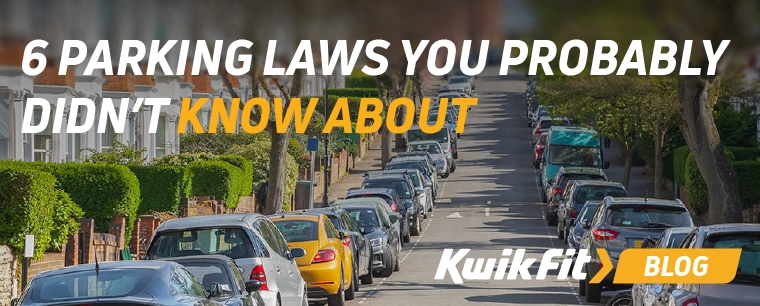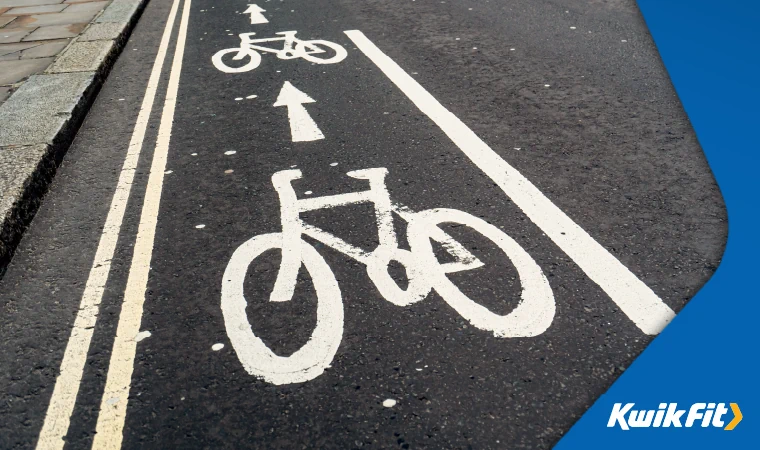6 Parking Laws You Probably Didn't Know About
Jessica Bird | Sunday 17th August 2025 11:00am

Many motorists don’t give a second thought to specific parking laws when they successfully pull off a parallel park, or reverse safely into a bay: they simply apply common sense and their knowledge of the rules of the road. However, there are many little-known laws that even the most experienced drivers fall foul of when it comes to finding a spot for their car.
With over 300 individual driving laws set out in The Highway Code, parking your car without breaking an obscure rule is in fact much more difficult than the average driver might think. For each driving regulation or bylaw you knowingly follow when leaving your car parked up, there are a whole host of laws that you have likely never heard of.
Here, we take a look at six parking laws you may not know about, giving you all the information you need to avoid parking fines, points on your licence, or worse.
1. Distance from the kerb
- It's legally required to park within 50cm of the kerb.
- Parking further out could lead to an on-the-spot fine.
- Parking in front of a dropped kerb is considered an obstruction and is a fineable offence.
It may sound like common sense to ensure you park your vehicle as close to the kerb as possible when parking on a street, but are you aware that there is a legally defined maximum gap allowed?
Enforced to prevent your car protruding too far into a road and creating a hazard for other road users, it is a legal requirement to park your vehicle no more than 50cm away from the pavement. If you leave your car parked more than 50cm away from the kerb, you could find yourself slapped with an on-the-spot parking fine.
It’s also important to remember that parking next to a dropped kerb could land you with a hefty fine. These gaps in the pavement are designed to allow vehicles to cross the pathway between the road and a driveway. They serve not only commercial and residential properties, but also provide accessways for the emergency services. Naturally, therefore, it is an offence to block them.
2. Asking a stranger
- Asking a stranger for spare change at a parking meter can fall under Section 4 of the Vagrancy Act 1824.
- The offence could still lead to a fine or up to three months in prison.
Incredibly, asking a stranger for spare change to use in a parking meter is actually illegal. Although you are very unlikely to be prosecuted for this offense today, according to Section 4 of the Vagrancy Act 1824, ‘going about as a gatherer or collector of alms’ can be lawfully applied to this scenario, and can be punishable with a fine and up to three months in prison! Even more reason to make sure your contactless parking app is up to date.
3. Know your road markings
- No parking in cycle lanes with a solid white line; avoid those with a broken line unless absolutely necessary.
- Parking near crossings, junctions, or schools on zigzags is also fineable.
- On country lanes, don’t park on roads with solid white edge lines.
Other than never parking on double yellows, many drivers would admit to not paying too much attention to the various other painted road markings and lines. However, when it comes to parking, knowing what some of the more obscure roadside markings indicate could save you from an unwanted fine. For example, cycle paths are a common sight on UK roads. But do you know the law when it comes to parking in these areas?
- According to The Highway Code, a solid white line marking out a cycle lane indicates a mandatory area which motorists cannot either drive or park in.
- A broken white line is an advisory marking to make motorists aware they should not drive or park in this cycle lane unless absolutely necessary.
- Drivers who are caught parking in a cycle lane without a valid emergency reason may be given a £30 Fixed Penalty Notice.
- The same applies to parking on yellow zigzags located near major junctions, zebra crossings or in marked school areas.
- Finally, on rural country lanes, solid white lines that flank both sides of the road are there to warn motorists where the edge of the road is. These will usually be found in areas where street lights are not in use. Deliberately stopping or parking on the sides of these roads is not permitted, and could result in a Penalty Charge Notice.

4. Leaving lights on
- Sidelights should stay on when parked on roads with a speed limit over 30mph.
- Facing the wrong way (against traffic flow) also requires sidelights to be on.
- Parking within 10 metres of a junction? Sidelights must stay on there too.
While it may sound counterintuitive to leave any of your vehicle’s lights switched on when your car is parked, there are, in fact, specific circumstances when you are legally required to do so. Although not enforced very often these days, The Highway Code dictates that sidelights should always be left on whenever your car is parked on a road or lay-by with a speed limit of more than 30mph.
This law also applies if you are planning to park your car on the side of the road facing away from the direction of traffic flow, or are less than 10 metres away from the nearest junction.
5. Marking your territory
- ‘Reserving’ a space with cones, bins, or signs is illegal and could lead to a £100 fine.
- No legal right to the space outside your home or workplace unless it's a driveway.
- A car isn’t committing an offence unless it's blocking access or overhanging a dropped kerb.
If you live or work in a property that requires you to leave your vehicle parked on the street, rather than a personal driveway, private car park or garage, it can be incredibly frustrating when you are unable to find a space. While it can often be tempting to use traffic cones, wheelie bins or signs to ‘reserve’ a parking space near your home or office, this can be seen as illegally causing a dangerous obstruction on the road and result in a Fixed Penalty Notice of £100.
It’s worth remembering that, frustrating as it can be, unless a car is blocking a driveway or its wheel is protruding over the dropped kerb in front of a home or workplace, no offence has been committed. Unless the street or road in question is governed by parking permits, any motorist can park legally on a street, as long as they are not causing any obstructions - and are complying with any additional restrictions.
6. Keeping it clean
- Obscured number plates caused by dirt build-up are illegal.
- An unreadable number plate can result in a fine of up to £1,000.
- Wipe plates regularly to stay compliant, even if your car is just parked.
While allowing your car to get dirty isn’t illegal, you could be breaking the law if a buildup of dirt and grime develops to the extent that the vehicle’s number plate becomes unreadable. If your car is left parked on the side of the road for a prolonged period of time, particularly during the winter when road salt and grit mix with rain and can cake the backs of cars, this is something you certainly need to watch out for.
Motorists found to have a dirty, unreadable number plate on their car can face fines of up to £1,000, regardless of whether the car has remained parked while the dirt has accumulated or not. To avoid a potentially hefty fine, it is recommended that you wipe down your number plates regularly in order to ensure they stay legible, even when you are just leaving your car on the side of a road.
Stay on the right side of the law
UK parking laws can feel complicated, but keeping these obscure laws in mind and ensuring you are up to date with any changes to The Highway Code will not only make you a better driver but also potentially save you a lot of money on wholly avoidable fines.
From keeping your car clean and number plates legible, to investing in preventative maintenance and ensuring your vehicle is safe and road legal, small actions can make a big difference. For peace of mind and expert support, visit your local Kwik Fit; we can help keep your car in top condition and fully compliant with road safety standards.
Any facts, figures and prices shown in our blog articles are correct at time of publication.
Featured Articles
Is it Illegal to Drive With One Headlight?
Saturday 19th July 2025
Wondering if it’s illegal to drive with one headlight? Learn about the safety risks and penalties of illegal blown bulbs and why you should fix them promptly.
Air Con in EVs & Hybrids: Experts Answer Your Questions
Monday 30th June 2025
Does air con drain EV batteries? Can you use the air con while charging an electric car? Find out the answers to these questions & more from Kwik Fit’s experts.
Why Is Your Car Making a Noise? Fixes & Tips
Friday 13th June 2025
When your car starts making unexpected noises, it can certainly be quite disconcerting; it may be nothing to worry about, but here’s what you need to know.









